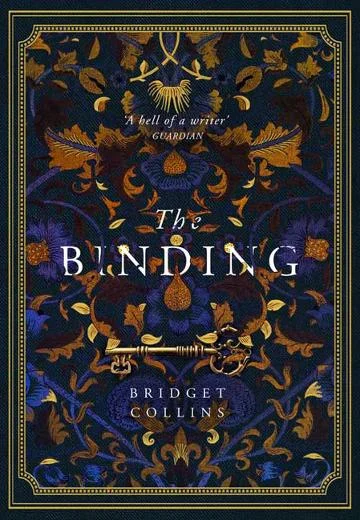First of all, a huge welcome to our new Sunday Riverbend Readers! We look forward to meeting you all at the July Bookclubs!
This month, Riverbend readers suspended reality and dived into Bridget Collins' Fantasy blockbuster The Binding, which won a huge thumbs up from an overwhelming majority of book clubbers this month - much to Chloe's delight. Though there were a few who couldn't bear it, and some who couldn't finish (Splotch's brutal death was a step too far), most readers really enjoyed the story, with a few citing it as their favourite book of the year.
The book is divided into three sections, with three separate points of view. Most readers didn't mind the change of narration, while others found it a bit hard to follow. For some, the slow and mysterious beginning was as tough to get through as a pool of molasses, while for others it built intrigue and spurred them on. We talked about the challenges of telling a story when the narrator has huge chunks of his memory missing and many of us found that Collins failed to rise to them with the result that part one was repetitive, confusing and clunky. Others found the missing parts of Emmett’ s memories only added to the suspense. Whatever the views of the opening of the novel, by parts 2 and 3 most readers were swept away by the romance and intrigue of Emmett and Lucien’s relationship.
We all felt that the premise of wiping memory by recording and storing it in a beautifully bound book was clever and had much relevance to the modern world. With social media, we now leave digital footprints all over the place, which binds us in ways we cannot control – our precious memories are on display for everyone to gawk at. We talked about memory and how it impacts our experience of the present and the dangers and positives of erasing it. On balance most people said that no matter how horrible a memory was they would not want it gone from their consciousness since doing so would remove a part of themselves. As one reader put it ‘our memories give us wisdom and that is our greatest asset’. However, we did concede that for some people denying the past and recreating history is the only way they can survive and that in these cases remembering the past accurately can be catastrophic. While some readers thought perhaps erasing an assault or trauma might be beneficial, we all agreed that messing with memory would be a risky business.
We discussed other therapies that could be likened to binding, such as electro-shock therapy, repressed memory therapy, assisted suicide and psychotropic drugs – one reader raised her glass and merrily proclaimed “Drinking!” We also likened the binding of Emmett and Lucien to the practice of “praying the gay away” with aversion therapy, and lamented that in some places, this practice still occurs.
The consensus was that this book was set in Victorian times, although there were a few discrepancies that annoyed a few readers – the appearance of a clock, the literacy of the characters and the conflicting timeline of the crusades (although, we agreed these were different crusades altogether!). Most readers loved Collins' ability to describe a setting and adored the pastoral scenes in particular.
For the most part, readers really identified with these characters and wanted their romance to survive and flourish, however a few readers were put off by their seeming disregard for Alta and Honour’s feelings. We felt that Collins had used a familiar romance novel trope in having the boys despise each other at first before admitting their attraction, and many readers found it refreshing that she would use this plot line for two boys.
The idea of unscrupulous binders selling people’s memories without their consent had us shaking our heads. We were horrified at the prospect of trading in peoples’ memories and compared this to tabloid journalism which profits from peoples’ pain.
We talked about the power the male abusers in the novel asserted over their victims by erasing their memories of the abuse and compared this to the phenomenon of ‘Gaslighting’ where a person’s memories and interpretation of an event are denied and invalidated. We thought this was particularly relevant to the ‘Me too’ movement but that it had universal application in any situation where a power imbalance existed.
We questioned Emmett’s burning of the books and the memories contained in them at the end of the book and felt that this was a bit out of character. What would happen to all those memories? Would there be people all over the city remembering things, for better or worse? Some thought this might make a great sequel….!
All in all, another great week of discussion!
See you next month!
Vicky, Britt, Laura and Chloe

